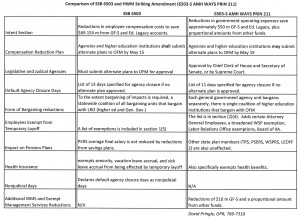Today Senate Policy Committees were busy moving bills forward before the cut-off deadline on Friday.
Senate Higher Education & Workforce Development
The Senate Higher Education & Workforce Development Committee passed a tuition policy bill for the University of Washington, Washington State University, and Western Washington Univerrsity.
Substitute Senate Bill 6562 allows the board’s of UW, WSU, and WWU to set tuition rates within limits. Tuition (the average annual compounded rate of change of undergraduate tuition fees)at these institutions is not allowed to exceed 9% based on the previous 15 years or 14% in any one year. In addition, the Committee on Higher Education Performance is created and authorized to approve performance agreements for UW, WSU, and WWU. Finally, these institutions must waive full-time tuition/fees for resident undergraduate students based on family and state median family income levels. The waivers are based on a graduated scale based on state median family income and institutional tuition fee rates.
For Evergreen as well as Central Washington University, Eastern Washington University, and the community and technical colleges tuition fee setting authority remains the same as current law.
The substitute bill was further amended in committee. The amendments establish a sunset for tuition setting authority for the three institutions in the bill at the end of the 2017-18 academic year; change the title from Relating to higher education finance to Relating to higher education accountability and access; and modifies the Committee on Higher Education Performance to include members from the minority party.
Substitute Senate Bill 6562 passed unanimously out of committee. The bill is now headed to Senate Ways & Means for their consideration.
Senate Early Learning & K-12 Education
The Senate Early Learning & K-12 Education committee took action on an omnibus teacher preparation and K-12 bill. Substitute Senate Bill 6696 includes the following changes related to teacher preparation.
Section 402: Clarifies that community colleges and non-higher education providers can be considered for new providers of the alternative routes. Moves the option for residency teacher preparation programs to provide a summary of procedures providing flexible completion opportunities to section 403 and makes it part of what alternative route providers must include in their application.
Section 403: Removes “higher education” since such institutions will not be the only providers of alternative routes.
Section 409: Clarifies that the service regions for institutions of higher education is for those institutios of higher education as defined in RCW 28B.10.016 (all the 4-year universities and college & the community and technical colleges).
In addition, Substitute Senate Bill 6696 was amended as follows related to teacher preparation: (1) Amends the four-level evaluation system for teachers to use student growth data if available and relevant to the teacher and subject matter. Requires the school districts participating in the pilot of the teacher and principal evaluations to submit all student data to OSP; (2) Amends section 202 by adding a parent representative to the group that will create models for implementing the new teacher and principal evaluation system, student growth tools, professional development programs, and evaluator training for classroom teachers and principals. The parent representative must have certain specified qualities and will be chosen by the PTA using a lottery system; (3) Moves the phrase addressing professional development so that it applies to both closing the achievement gap and STEM; and (4) Amends the evaluation criteria for classroom teachers in section 202 to include collaborating, not just communicating with parents and school community.


